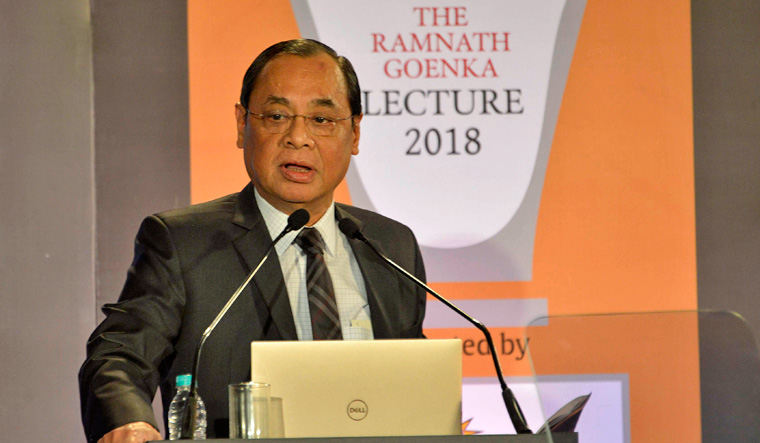In an apparent reference to the controversial press conference by four Supreme Court judges in January this year, of which he too was a party, Justice Ranjan Gogoi on Thursday said “noisy judges” were democracy's first line of defence.
Borrowing from a newspaper article on the state of the judiciary, in which it was said that independent judges and noisy journalists were democracy's first line of defence, Gogoi said, “I agree but will only suggest a slight modification in today's context—not only independent judges and noisy journalists, but even independent journalists and sometimes noisy judges.”
The Supreme Court judge, who delivered the third Ramnath Goenka Lecture, said in a clear indication to the ongoing debate set off by the unprecedented press conference that he cannot recall the last time the judicial wing of the state made so much news.
“The bedrock principles (of judiciary) have been the talk of the town lately considering how the entire think tank is so keenly focused on it,” he observed.
Gogoi's remarks have to be seen in the backdrop of the extreme reactions that the judges' media briefing evoked. While there was support from certain quarters, there has also been immense criticism from others, including eminent members of the legal fraternity.
The judge had joined three other seniormost judges – Justice J. Chelameswar, Justice Madan Lokur and Justice Kurian Joseph – in the controversial press conference, in which serious questions were raised about the manner in which Chief Justice of India Dipak Misra was administrating the apex court. A major charge made by the judges was of selective allocation of politically sensitive cases by Misra to handpicked benches.
In the light of Gogoi's participation in the press conference, in which government interference in the court's working was alluded to, there is immense speculation on whether the judge, who is the second seniormost in the Supreme Court and the next in line to become the Chief Justice of India, could be superseded.
Gogoi appeared to have referred to the alleged government apathy to the requirements of the judiciary to function efficiently, which includes having adequate number of judges, when he said, “The judiciary today is not a poor workman who blames his tools, but it is a workman with no tools.”
Quoting a French author, he made his point about the judiciary pressing upon the government to clear recommendations for appointment of judges to the higher courts. “'Everything has been said already, but as no one listens, we must begin again.' I will only ask and request those at the helm to finally listen so that we must not have to begin again,” he said.
Terming the judiciary the last bastion of hope in the country, Gogoi said, “I will only say that if it wishes to preserve its moral and institutional leverage, it must remain uncontaminated. And, independent. And, fierce. And, at all times.”


